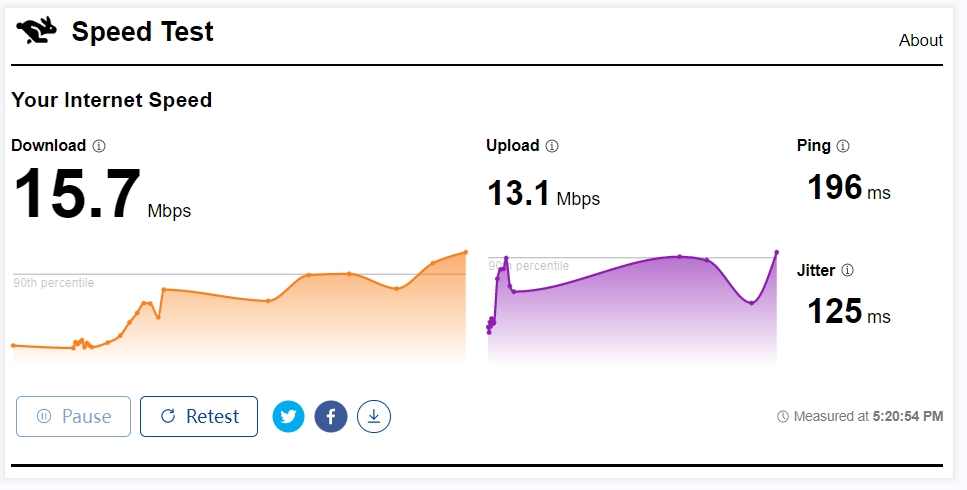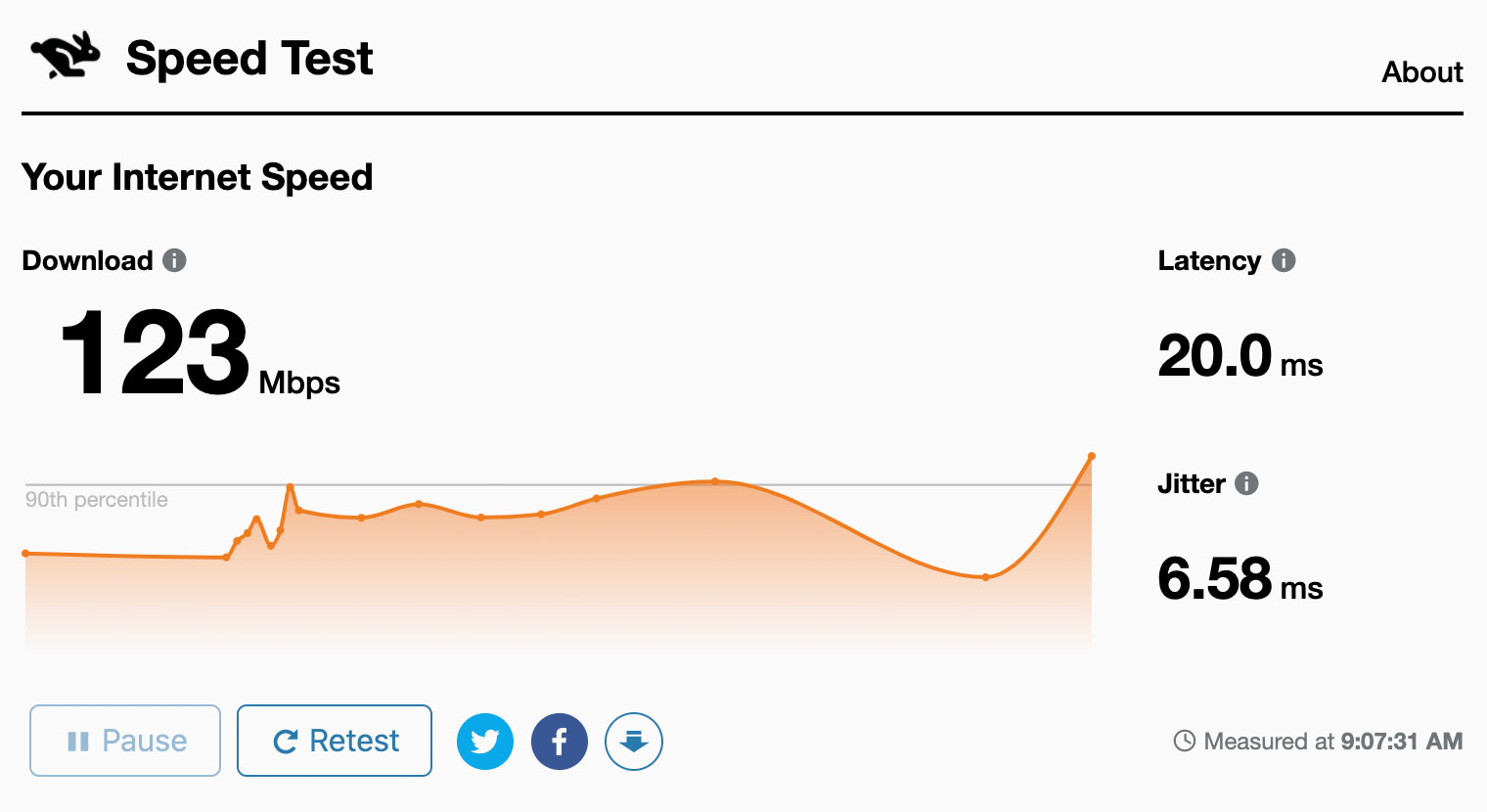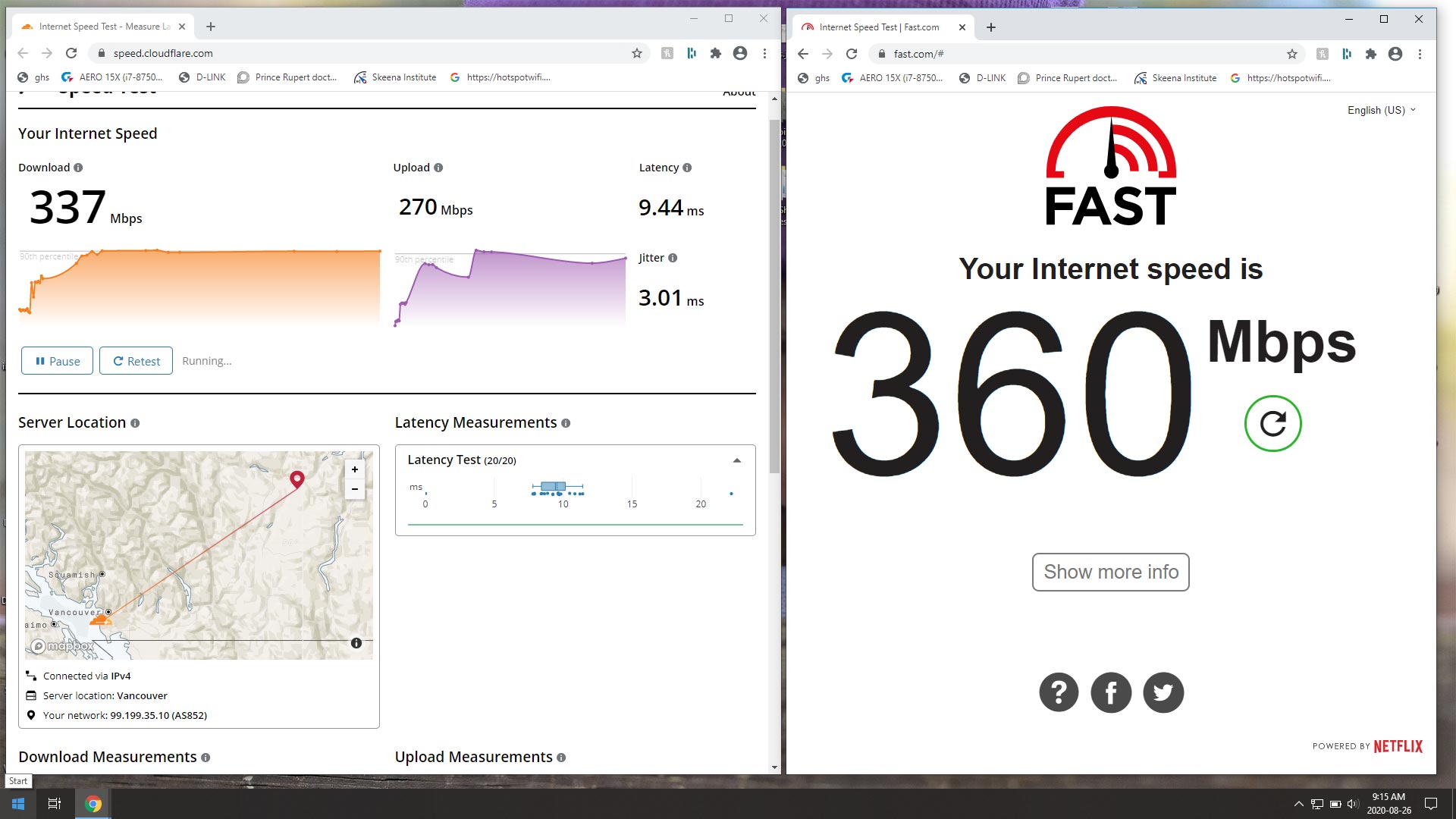Cloudflare Speed Test - How Fast Is Your Connection?
Have you ever felt like your internet connection is playing tricks on you, delivering a speedy experience one moment and then lagging the next? It's a common feeling, that, and knowing what's actually happening with your connection can feel a bit like trying to catch smoke. This is where tools designed to measure your internet's quickness and overall behavior come into play, offering a clearer picture of what your internet service provider (ISP) is truly delivering to your home or business. We're going to talk about one such helpful tool that many people rely on to check their connection's pulse.
Finding out what your internet connection is really doing involves more than just a quick glance at a loading bar. You want to see the finer points, like how fast things come down to your device, how quickly they go back up, and if there are any little stutters or lost pieces of information along the way. A good measurement tool gives you all these details, helping you figure out if your online experience is as smooth as it should be, or if there might be some bumps in the road. So, it's almost like getting a health report for your internet connection, in a way.
One very popular option for checking your internet's performance is the Cloudflare speed test. This tool, which operates from a vast network of data centers around the globe, gives you a look at your connection's current state. It helps you see how well your internet is doing, whether you are just browsing, streaming your favorite shows, or engaging in online activities that require a really quick connection. We'll look at how this particular speed test works and what kind of useful information it can give you about your internet's actual quickness.
- Hdhub4u Your Source For Unlimited Hd Entertainment
- Embrace The Groove Funky Town Video Extravaganza
- Vega The Ultimate Guide To Data Visualization
- The Ultimate Guide To Mms Links Improve Your Mobile Marketing
- Discover The Unveiled Net Worth Of Business Magnate Hakan Sabanci
Table of Contents
- What Does the Cloudflare Speed Test Really Tell You?
- Getting Started with Your Cloudflare Speed Test
- How Does Cloudflare Speed Test Measure Performance?
- Beyond Just Numbers - The Cloudflare Speed Test and Website Health
- Can a Cloudflare Speed Test Help Your Website Load Faster?
- Exploring the Cloudflare Speed Test Ecosystem
- What About Cloudflare Speed Test and Overall Internet Quality?
- Where Can You Find the Cloudflare Speed Test?
What Does the Cloudflare Speed Test Really Tell You?
When you visit speed.cloudflare.com, you are, in some respects, tapping into a system that checks your internet connection's quickness and how well it is working. This tool is set up to give you a clear picture of several important aspects of your connection. You'll get to see your download quickness, which is how fast information comes to your computer or phone. You'll also see your upload quickness, meaning how fast information goes from your device out to the internet. These two numbers are usually what people think of first when talking about internet quickness, you know?
But the Cloudflare speed test goes a bit further than just those basic quickness measurements. It also looks at things like latency, which is the tiny delay it takes for a signal to travel from your device to a server and back. A low latency means your connection is very responsive, which is good for things like online video calls or interactive games. Then there is jitter, which tells you how much that delay changes over time. If your jitter is high, your connection might feel inconsistent, with sudden pauses or skips, which can be pretty frustrating, actually. The test also checks for packet loss, which happens when small pieces of data simply do not make it to their destination. Lost packets can lead to things like choppy audio or video, so, it's something you definitely want to keep an eye on.
All these individual measurements come together to give you a network quality score. This score is, in a way, a summary of how well your internet connection is performing overall. It helps you get a sense of whether your ISP is doing a good job providing a stable and quick connection. What is really nice about this tool is that it focuses on giving you information about your connection's behavior without collecting or selling your personal data. That is a pretty important detail for many people, you know, when it comes to privacy.
- The Comprehensive Guide To Deep Hot Linking Techniques And Best Practices
- Discover Topnotch Kannada Entertainment With 5rulz Kannada
- Ultimate Guide To Unlocking The Power Of Flix
- See The Best Viral Video Porn Stars You Never Seen Before
- Discover The Gateway To Vegas Vegasist Unveiled
Getting Started with Your Cloudflare Speed Test
Using the Cloudflare speed test is quite simple, which is good. You just need to go to speed.cloudflare.com in your web browser. Once you are there, the tool usually starts running its checks automatically, or you might see a clear button to begin the test. It connects to Cloudflare's large network, which has data centers in over 300 cities around the world. This means it can often find a server close to you to get a more accurate reading of your local connection quickness. That, in itself, is a useful feature.
As the test runs, you will see the numbers for your download quickness, upload quickness, latency, and jitter appear on the screen. It can be quite interesting to watch these figures change as the test progresses. Once it is finished, you get a full report of your connection's performance. The tool also offers tips for how to get more accurate results, like making sure you are not using other internet-heavy applications while the test is running. So, it's pretty user-friendly, basically, and guides you through the process.
How Does Cloudflare Speed Test Measure Performance?
The Cloudflare speed test works by sending and receiving data packets between your device and its servers. When it checks your download quickness, it measures how fast data can be pulled from its network to your computer. For upload quickness, it does the opposite, seeing how quickly data can be pushed from your computer to its network. These tests are done multiple times to get a reliable average, which is pretty standard for these sorts of tools. It's a way to make sure the numbers you see are a good reflection of your typical experience, you know.
Latency is measured by timing how long it takes for a small data packet to make a round trip from your device to a Cloudflare server and back. Jitter is then calculated by looking at the variation in those round-trip times. If the times are very consistent, your jitter will be low. If they vary a lot, your jitter will be higher. Packet loss is simply counted by seeing how many of those small data packets do not make it to their destination at all. All these measurements are crucial for a full picture of your connection, not just the raw quickness. So, it really looks at the quality, too.
It is worth noting that Cloudflare and OpenSpeedTest are both considered reliable ways to check your internet connection. Both of these services use servers in many different places, which helps them get a good sense of your connection's quickness and how well it behaves. They measure different parts of your connection, like how fast it is and any delays it might have. This means you can often get a comprehensive view by trying out a few different reputable tools, just to be sure, in a way, that you are getting consistent results. This approach can be very helpful for getting a complete picture.
Beyond Just Numbers - The Cloudflare Speed Test and Website Health
While the Cloudflare speed test is great for checking your internet connection, Cloudflare also offers tools that look at the quickness and performance of websites themselves. One of these tools lets you test your website's quickness using Lighthouse audits, which are like a detailed check-up for a webpage. It also uses real user data, which means it looks at how actual visitors experience your site's loading quickness. This is very useful because it gives you a real-world perspective, not just a theoretical one, you know.
With these website quickness tools, you can choose where the test comes from, how often it runs, and what kind of plan you want. Based on the results, you can get suggestions for how to make your website load faster and even find ways to save money on your hosting or other services. It's about making your site a better experience for anyone who visits it. So, it's not just about your home internet; it's also about how quickly your online presence shows up for others, which is, in some respects, just as important.
Can a Cloudflare Speed Test Help Your Website Load Faster?
Absolutely, a Cloudflare speed test, or rather, the tools Cloudflare offers for website quickness, can certainly help make your website load more quickly. Many different groups, including Cloudflare, provide services to test how fast a website appears on screen. These tests can often point out specific parts of a webpage that are slowing things down. For instance, they might tell you if an image is too large or if a script is taking too long to run. This kind of detail is incredibly helpful for website owners, because it gives them clear actions to take. So, it's not just a general quickness score; it is more like a precise diagnostic report.
Beyond simply checking quickness, Cloudflare also provides services that can directly improve your website's performance. They offer free content delivery network (CDN) services. A CDN works by storing copies of your website's content on servers located closer to your visitors. So, if someone in Europe wants to see your website, and your main server is in the United States, the CDN can serve them a copy from a server in Europe instead. This means the information has less distance to travel, which makes your website appear much faster and reduces any delays. It is a pretty effective way to speed things up for people all over the world, you know, making your site more accessible.
Exploring the Cloudflare Speed Test Ecosystem
The Cloudflare speed test is just one piece of a larger set of tools and data that Cloudflare provides. For instance, they have something called Cloudflare Radar, which now includes an internet quality page. This page gives you a look at internet connection performance and quality at both a country level and for specific networks. It shows how bandwidth, latency, and jitter change over time, using data from benchmark tests and also results from speed.cloudflare.com. This means you can see broader trends in internet quickness and quality, which is, in a way, very informative for researchers or anyone interested in how the internet is doing in different places.
Every year, Cloudflare also puts out a "Radar Year in Review." Their 2023 report was their fourth one, and it goes over internet patterns and trends they saw throughout the year. This report looks at traffic, how connected different parts of the world are, and various quickness measurements, all based on the vast amount of data Cloudflare's network collects. It gives a broad picture of the internet's health and how it is changing, which is, you know, a pretty big deal for understanding the global digital environment. The speed test tool itself is now fully running on Cloudflare's own data centers, which are spread out across more than 300 cities, making it very efficient.
You can also use the Cloudflare speed test on different devices. They offer free applications for both desktop computers and mobile phones, so you can check your internet quickness no matter where you are or what device you are using. This makes it very convenient for people who want to keep an eye on their connection from anywhere. If you have a website that uses Cloudflare's services, you can even run quickness tests directly from your Cloudflare dashboard. These tests give you information about how quickly your website loads, how it performs with and without Cloudflare's proxy services, and even suggest ways to make things better. So, it is pretty integrated for website owners, too.
What About Cloudflare Speed Test and Overall Internet Quality?
When we talk about internet quality, it is not just about how many megabits per second you are getting. It is also about how stable that connection is, how quickly it responds, and if it loses any information along the way. The Cloudflare speed test provides insights into all these aspects, giving you a more complete picture of your internet's health. For instance, if your download quickness is high but your jitter is also high, you might still experience issues with video calls or online gaming, because the connection is not consistent. So, it is about the whole experience, you know, not just one number.
The information gathered by tools like the Cloudflare speed test contributes to a larger understanding of internet performance globally. When many people use these tests, the aggregated data can show patterns and trends in internet quickness and reliability across different regions and networks. This kind of information is helpful for internet service providers, policy makers, and even everyday users who want to compare their connection to others. It helps to build a clearer picture of how the internet is performing on a wider scale, which is, in some respects, quite valuable for everyone involved.
Sometimes, if you are having trouble getting the Cloudflare speed test to run, or if the results seem off, there might be a simple explanation. For example, if you are blocking certain "user agents" – which are basically identifiers that websites use to know what kind of browser or device you are using – it could interfere with the test. Making sure your settings allow for these kinds of connections can help ensure you get accurate readings. It is just a small troubleshooting tip that can make a big difference, you know, in getting reliable results.
Where Can You Find the Cloudflare Speed Test?
The primary place to find the Cloudflare speed test is its dedicated website: speed.cloudflare.com. This is where most people go to quickly check their internet connection's quickness and quality. It is designed to be very straightforward and easy to use, so you can get your results without much fuss. This website provides the core functionality that many individuals are looking for when they want to see how their internet is performing. So, it is a good starting point for anyone curious about their connection, really.
Beyond the main website, as mentioned earlier, Cloudflare also offers applications for desktop computers and mobile devices. These apps allow you to run the speed test directly from your chosen device, which can be very convenient if you prefer to have a dedicated tool rather than opening a web browser. For website owners who are already using Cloudflare's services, the speed test functionality is also available within the Cloudflare dashboard. This integration means you can check your website's quickness and get optimization suggestions all from one central place, which is, in a way, very efficient for managing your online presence. Cloudflare also has documentation available, often referred to as "Cloudflare Speed Docs," which provides more information on how to use their tools and what the results mean. You can also find information about Cloudflare's Observatory, another tool for assessing website performance, through their documentation. Basically, there are several ways to access and use the Cloudflare speed test and related tools, depending on your needs and preferences.
This article has covered how the Cloudflare speed test works, what it measures, and how it can help you understand your internet connection's quickness and quality. We also looked at how Cloudflare's tools extend to website performance, offering insights and ways to make your online presence faster. We discussed where to find the test, including its website, apps, and integration within the Cloudflare dashboard, and touched on its role in broader internet quality reporting.
- The Ultimate Guide To Yumi Etos Captivating Hamster Encounters
- The Ultimate Guide To Subhashree Videos Everything You Need To Know
- Ellen Pompeos Face Scars Uncovering The Story Behind Her Unique Beauty
- Exclusive Collection Of Indian Mms Sites Uncensored And Unfiltered
- Did Gwen And Blake Welcome A New Baby Heres The Scoop

Cloudflare DNS | Definition & Status Check & Login & Speed Test

Cloudflare speedtest - houselokasin

Cloudflare Speedtest - Tech - HTMF